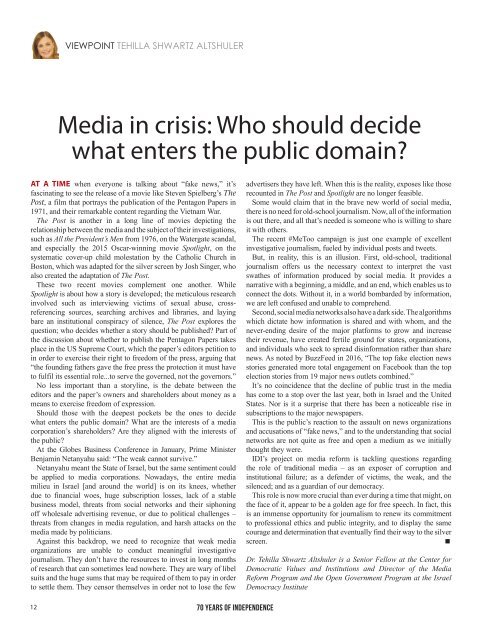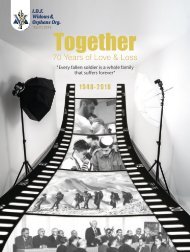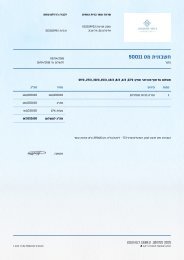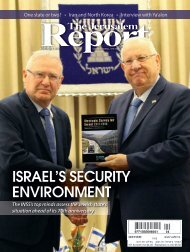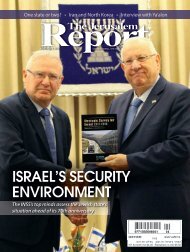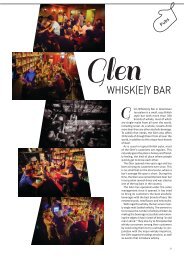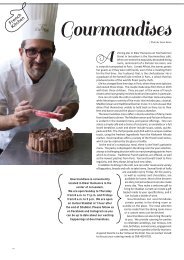IDI.2018
Create successful ePaper yourself
Turn your PDF publications into a flip-book with our unique Google optimized e-Paper software.
VIEWPOINT TEHILLA SHWARTZ ALTSHULER<br />
Media in crisis: Who should decide<br />
what enters the public domain?<br />
AT A TIME when everyone is talking about “fake news,” it’s<br />
fascinating to see the release of a movie like Steven Spielberg’s The<br />
Post, a film that portrays the publication of the Pentagon Papers in<br />
1971, and their remarkable content regarding the Vietnam War.<br />
The Post is another in a long line of movies depicting the<br />
relationship between the media and the subject of their investigations,<br />
such as All the President’s Men from 1976, on the Watergate scandal,<br />
and especially the 2015 Oscar-winning movie Spotlight, on the<br />
systematic cover-up child molestation by the Catholic Church in<br />
Boston, which was adapted for the silver screen by Josh Singer, who<br />
also created the adaptation of The Post.<br />
These two recent movies complement one another. While<br />
Spotlight is about how a story is developed; the meticulous research<br />
involved such as interviewing victims of sexual abuse, crossreferencing<br />
sources, searching archives and libraries, and laying<br />
bare an institutional conspiracy of silence, The Post explores the<br />
question; who decides whether a story should be published? Part of<br />
the discussion about whether to publish the Pentagon Papers takes<br />
place in the US Supreme Court, which the paper’s editors petition to<br />
in order to exercise their right to freedom of the press, arguing that<br />
“the founding fathers gave the free press the protection it must have<br />
to fulfil its essential role...to serve the governed, not the governors.”<br />
No less important than a storyline, is the debate between the<br />
editors and the paper’s owners and shareholders about money as a<br />
means to exercise freedom of expression.<br />
Should those with the deepest pockets be the ones to decide<br />
what enters the public domain? What are the interests of a media<br />
corporation’s shareholders? Are they aligned with the interests of<br />
the public?<br />
At the Globes Business Conference in January, Prime Minister<br />
Benjamin Netanyahu said: “The weak cannot survive.”<br />
Netanyahu meant the State of Israel, but the same sentiment could<br />
be applied to media corporations. Nowadays, the entire media<br />
milieu in Israel [and around the world] is on its knees, whether<br />
due to financial woes, huge subscription losses, lack of a stable<br />
business model, threats from social networks and their siphoning<br />
off wholesale advertising revenue, or due to political challenges –<br />
threats from changes in media regulation, and harsh attacks on the<br />
media made by politicians.<br />
Against this backdrop, we need to recognize that weak media<br />
organizations are unable to conduct meaningful investigative<br />
journalism. They don’t have the resources to invest in long months<br />
of research that can sometimes lead nowhere. They are wary of libel<br />
suits and the huge sums that may be required of them to pay in order<br />
to settle them. They censor themselves in order not to lose the few<br />
advertisers they have left. When this is the reality, exposes like those<br />
recounted in The Post and Spotlight are no longer feasible.<br />
Some would claim that in the brave new world of social media,<br />
there is no need for old-school journalism. Now, all of the information<br />
is out there, and all that’s needed is someone who is willing to share<br />
it with others.<br />
The recent #MeToo campaign is just one example of excellent<br />
investigative journalism, fueled by individual posts and tweets.<br />
But, in reality, this is an illusion. First, old-school, traditional<br />
journalism offers us the necessary context to interpret the vast<br />
swathes of information produced by social media. It provides a<br />
narrative with a beginning, a middle, and an end, which enables us to<br />
connect the dots. Without it, in a world bombarded by information,<br />
we are left confused and unable to comprehend.<br />
Second, social media networks also have a dark side. The algorithms<br />
which dictate how information is shared and with whom, and the<br />
never-ending desire of the major platforms to grow and increase<br />
their revenue, have created fertile ground for states, organizations,<br />
and individuals who seek to spread disinformation rather than share<br />
news. As noted by BuzzFeed in 2016, “The top fake election news<br />
stories generated more total engagement on Facebook than the top<br />
election stories from 19 major news outlets combined.”<br />
It’s no coincidence that the decline of public trust in the media<br />
has come to a stop over the last year, both in Israel and the United<br />
States. Nor is it a surprise that there has been a noticeable rise in<br />
subscriptions to the major newspapers.<br />
This is the public’s reaction to the assault on news organizations<br />
and accusations of “fake news,” and to the understanding that social<br />
networks are not quite as free and open a medium as we initially<br />
thought they were.<br />
IDI’s project on media reform is tackling questions regarding<br />
the role of traditional media – as an exposer of corruption and<br />
institutional failure; as a defender of victims, the weak, and the<br />
silenced; and as a guardian of our democracy.<br />
This role is now more crucial than ever during a time that might, on<br />
the face of it, appear to be a golden age for free speech. In fact, this<br />
is an immense opportunity for journalism to renew its commitment<br />
to professional ethics and public integrity, and to display the same<br />
courage and determination that eventually find their way to the silver<br />
screen.<br />
<br />
Dr. Tehilla Shwartz Altshuler is a Senior Fellow at the Center for<br />
Democratic Values and Institutions and Director of the Media<br />
Reform Program and the Open Government Program at the Israel<br />
Democracy Institute<br />
12<br />
70 YEARS OF INDEPENDENCE


